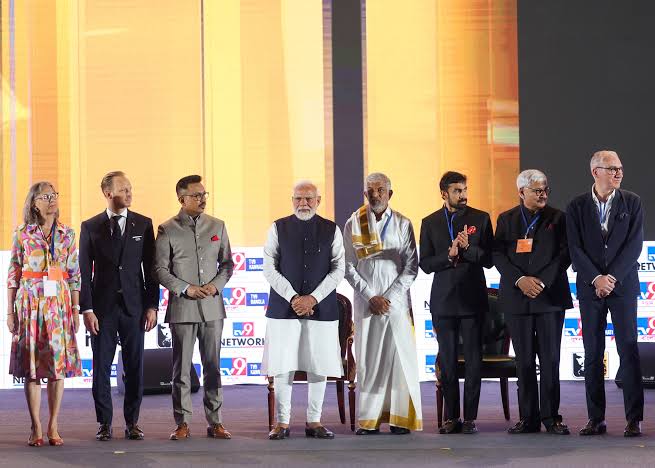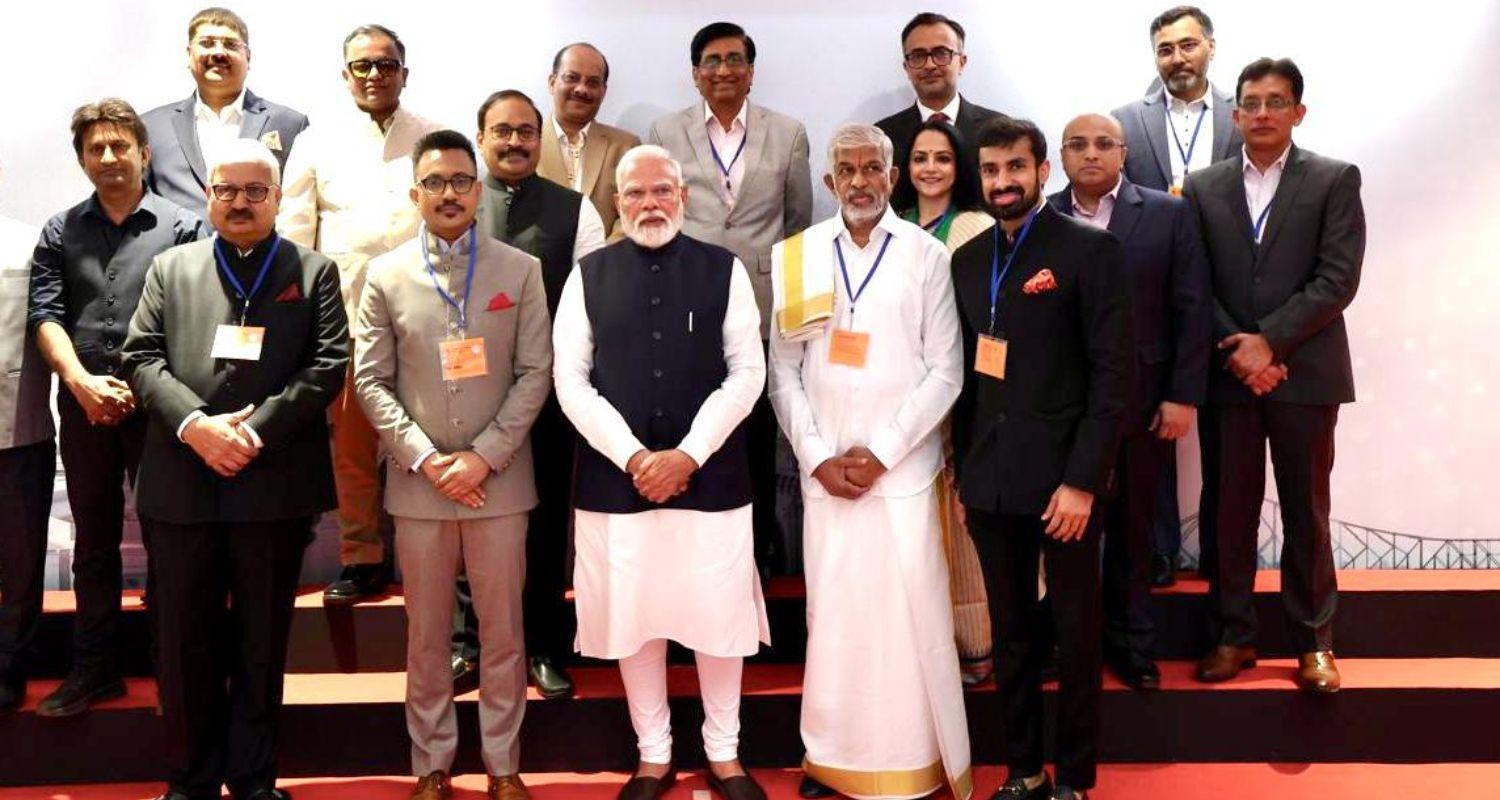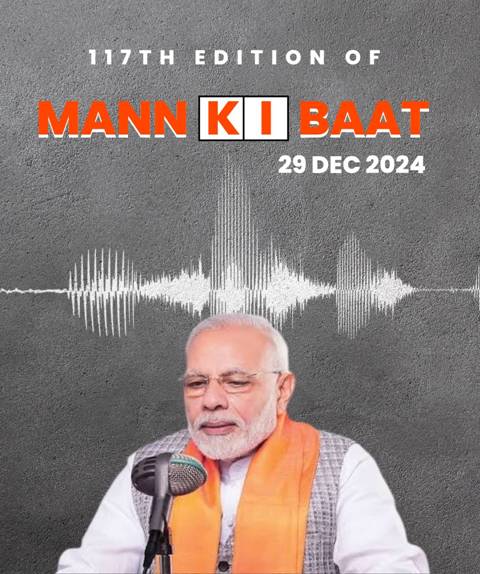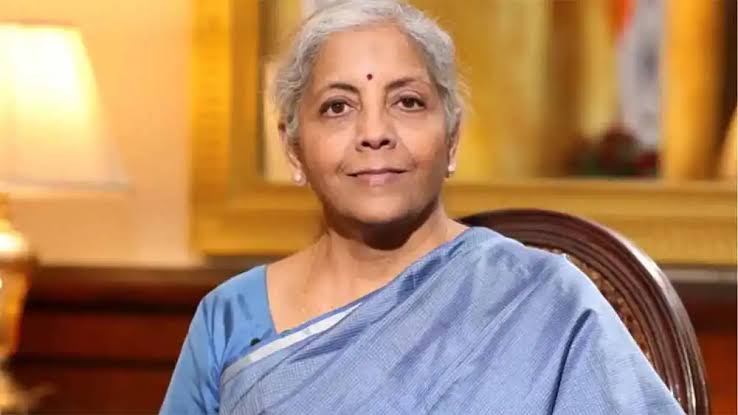Prime Minister Narendra Modi addressed the TV9 Summit 2025 at Bharat Mandapam, New Delhi, leaving the audience inspired with his vision of India’s growth story and its evolving role on the world stage. Extending warm wishes to the team of TV9 and its global audience, the Prime Minister acknowledged the Indian diaspora who joined the event virtually, recognizing their enduring connection with the nation.
 In his address, the Prime Minister reflected on India’s incredible journey, stating that the eyes of the world are now on India. He reminded everyone that while India took 70 years after independence to become the 11th largest economy, it has risen to the 5th position within just the last 7-8 years. Citing an IMF report, he proudly mentioned that India is the only major economy to have doubled its GDP in the past decade, lifting 25 crore citizens out of poverty and giving birth to a dynamic neo-middle class with dreams, aspirations, and growing participation in the country’s progress.
In his address, the Prime Minister reflected on India’s incredible journey, stating that the eyes of the world are now on India. He reminded everyone that while India took 70 years after independence to become the 11th largest economy, it has risen to the 5th position within just the last 7-8 years. Citing an IMF report, he proudly mentioned that India is the only major economy to have doubled its GDP in the past decade, lifting 25 crore citizens out of poverty and giving birth to a dynamic neo-middle class with dreams, aspirations, and growing participation in the country’s progress.
The Prime Minister highlighted how India’s vast youth population is rapidly becoming skilled and is leading the country’s innovation wave. He emphasized that “India First” is not just a slogan but the guiding principle of the country’s foreign policy today. Moving away from the earlier stance of maintaining equal distance from all countries, he spoke of India’s new approach of being equally close to all — ensuring meaningful partnerships across the globe.
Reflecting on the global recognition of India’s contributions, the Prime Minister pointed out how the world now seeks to know “What India Thinks Today.” He proudly shared that India is no longer just participating in the world order but actively shaping it. He recalled how during the COVID-19 pandemic, while the world grappled with uncertainty, India rose to the occasion by developing its own vaccines, vaccinating its people at record speed, and supplying medicines to over 150 countries, guided by the values of service and compassion.
The Prime Minister spoke about how the global governance systems, long dominated by a handful of countries after World War II, are now witnessing India’s effort to make them more inclusive and human-centric. He referred to initiatives like the Coalition for Disaster Resilient Infrastructure, which India spearheaded to help the world better prepare for natural calamities, and the International Solar Alliance, which now has over 100 member countries committed to ensuring sustainable energy access.
He also highlighted India’s initiative in launching the India-Middle East-Europe Economic Corridor, a new trade route that will enhance global commerce and connectivity, while reinforcing India’s position as a key player in the global supply chain. He mentioned India’s leadership in ensuring that the African Union was made a permanent member of the G20 under India’s presidency, fulfilling a long-standing demand and ensuring a stronger voice for the Global South.
Turning to domestic achievements, the Prime Minister reminded the audience that while 25 years of the 21st century have passed, 11 of those years have been dedicated to building a new India under his government’s leadership. He spoke about how India’s development model, once questioned, is now being recognized and adopted by the world. He drew attention to how simple but vital changes in the lives of ordinary citizens—like access to toilets under Swachh Bharat Mission, affordable healthcare through Ayushman Bharat, clean cooking gas through Ujjwala Yojana, and financial inclusion via Jan Dhan Yojana—have transformed daily life for millions. He highlighted how the Har Ghar Nal Se Jal Yojana has brought tap water to countless rural households, something unimaginable a decade ago.
Prime Minister Modi shared how the nation’s commitment to efficiency and transparency is creating real change. He cited how obtaining a passport used to be a frustrating and tedious process, but today, with over 550 passport centers and reduced waiting periods, the system respects citizens’ time and convenience. He spoke of how banking services, once inaccessible to lakhs of villages, have now reached every corner of the country, with online banking and physical access points within a 5 km radius.
He proudly stated that India’s banks, once plagued with bad loans and NPAs, are now healthier, posting record profits, and recovering money from defaulters. He mentioned that ₹22,000 crore has been recovered and returned to those who were cheated. Recalling his government’s focus on simplification and removal of outdated laws, he noted that nearly 1,500 obsolete laws and over 40,000 compliance burdens have been eliminated, ensuring that citizens and businesses can function without unnecessary hurdles.
The Prime Minister spoke passionately about reforms like the Goods and Services Tax (GST), which replaced over 30 different taxes with one simplified tax system. He highlighted the success of the Government e-Marketplace (GeM), which has not only saved over ₹1 lakh crore of taxpayers’ money but also ensured transparency in government procurement. He shared that India’s Direct Benefit Transfer system has prevented over ₹3 lakh crore from falling into the wrong hands and that over 10 crore fake beneficiaries have been removed from government records.
Underscoring his government’s respect for taxpayers, Shri Modi mentioned how the tax filing process has become simpler and faster, with refunds now processed within days and the introduction of the faceless assessment scheme to ensure fairness.
The Prime Minister reflected on the remarkable mindset shift that has taken place across India in the last decade. He recalled how, for decades, imported products were considered superior, but now, there is pride in asking, “Is this Made in India?” He celebrated India’s achievements in manufacturing, such as developing the country’s first indigenous MRI machine and the massive growth in sectors like mobile phone manufacturing, telecom equipment, auto components, solar modules, and defence exports—all of which have created new jobs and strengthened the economy.
In his closing remarks, the Prime Minister emphasized that forums like the TV9 Summit play a vital role in shaping the country’s future. He recalled how, a century ago, India marched toward freedom with renewed determination and stated that today, India is marching toward becoming a developed nation by 2047. He acknowledged the role of India’s youth in this journey, praising TV9’s effort to engage thousands of young minds through the summit.
With conviction and hope, he concluded that India is no longer just a nation of dreams but a nation that delivers—firmly on the path to becoming a global leader while ensuring that the lives of its citizens continue to improve every day.




